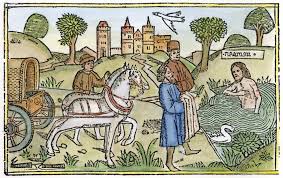 St Alban’s Episcopal Church Bolivar, Missouri Saturday, October 8, 2022 Tomorrow at St Alban’s Healing in Kings and in Luke Naaman and the ten lepers  2 Kings 5:1-3, 7-15 “Naaman, commander of the army of the king of Aram, was a great man in in favor with his master, because by him the Lord had given victory to Aram.” So what is this about the Lord of Israel giving victory to one of Israel’s enemies? Wasn’t God only interested in Israel? And yet every time any army wins, God gets credit. When Israel loses, the Bible says the people of God deserved it. When they win, God takes the credit. “This man, though a mighty warrior, suffered from leprosy.” And yet – it must not have been what we typically call leprosy because he was not restricted from being in the presence of the king and others. The word is used to indicate all sorts of skin diseases, including those that might be both painful and disfiguring but not contagious. The Arameans had taken a young Israelite girl captive and enslaved her to serve Naaman’s wife. “She said to her mistress, ‘If only my lord were with the prophet who is in Samaria! He would cure him of his leprosy.’ So the wife of the commander of an enemy army decides to believe this foreign, enslaved child? Why? How hard was it to convince her husband to ask the king to go to Samaria? Why does the king let him go? What letter does he write to the king of Israel? Why does the king freak out? “But when Elisha the man of God heard…he sent a message to the king. “Why have you torn your clothes? Let him come to me, that he might learn that there is a prophet in Israel.” So the commander goes…taking a whole lot of expensive gifts. It’s not a bribe. It isn’t even payment, exactly. The real reason is the middle eastern system of creating alliances that require people to do good things for each other. So he shows up, and Elisha doesn’t even come out to speak to this important man! “Elisha sent a messenger to him, saying, “Go, wash in the Jordan seven times, and your flesh shall be restored and you shall be clean.” But Naaman became angry…and went away angry. He was offended that the man of God didn’t go out to him, and annoyed that he was told to do something so simple. He went away in a rage.Once again it was lower-status persons – servants – who calmed him down and finally he agreed to do what the servant told him to do. “So when he went down and immersed himself seven times in the Jordan, according to the world of the man of God; his flesh was restored like the flesh of a young boy, and he was clean. Then he returned to the man of God, he and all his company; he came and stood before him and said, “Now I know there is no God in all the earth except in Israel.” So why is it so hard to do an easy thing? He would have done something hard – but was offended at being told to do an easy thing. Why do you suppose we struggle to believe that God works in the midst of the ordinary?  Luke 17:11-19 The story of the ten lepers follows the pattern we’ve already seen in Luke – It is the weak and often the foreigners, outsiders, the unaccepted ones who demonstrate faith and trust – and wisdom- and the ones who should know how God acts and how to respond to grace – often do not. We saw something similar in the story in 2 Kings.It wasn’t the commanding officer who had faith in the man of God, but his servants. It wasn’t the king of Aram who knew what to do for his honored friend, but an enslaved Jewish child. And it was the wife who trusted her and urged the commanding officer to talk to the king – Women children servants, and in Luke today, the hated Samaritan. What makes us grateful – and what does not, I wonder?  Adult Class 9:30 AM We will continue the book, After – We will probably get through chapters 5-10 or so. Please read it if you are able, and be ready to discuss.Come even if you haven’t – you’ll still enjoy the discussion. The conversation last Sunday was amazing. Far more people than we think have had this sort of mystical, “out of body” experience – not just the dying, either! |

Categories:
Tags:
No responses yet